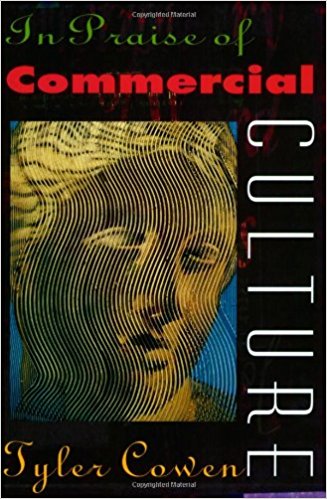 The Marginal Revolution Podcast is back with new episodes! We begin with what I think is our best episode to date. We revisit Tyler’s 1998 book In Praise of Commercial Culture. This is the book that put Tyler on the map as a public intellectual. Tyler and I also wrote a paper, An Economic Theory of Avant-Garde and Popular Art, or High and Low Culture, exploring themes from the book. But does In Praise of Commercial Culture stand the test of time? You be the judge!
The Marginal Revolution Podcast is back with new episodes! We begin with what I think is our best episode to date. We revisit Tyler’s 1998 book In Praise of Commercial Culture. This is the book that put Tyler on the map as a public intellectual. Tyler and I also wrote a paper, An Economic Theory of Avant-Garde and Popular Art, or High and Low Culture, exploring themes from the book. But does In Praise of Commercial Culture stand the test of time? You be the judge!
Here’s one bit:
TABARROK: Here’s a quote from the book, “Art and democratic politics, although both beneficial activities, operate on conflicting principles.”
COWEN: So much of democratic politics is based on consensus. So much of wonderful art, especially new art, is based on overturning consensus, maybe sometimes offending people. All this came to a head in the 1990s, disputes over what the National Endowment for the Arts in America was funding. Some of it, of course, was obscene. Some of it was obscene and pretty good. Some of it was obscene and terrible.
What ended up happening is the whole process got bureaucratized. The NEA ended up afraid to make highly controversial grants. They spend more on overhead. They send more around to the states. Now, it’s much more boring. It seems obvious in retrospect. The NEA did a much better job in the 1960s, right after it was founded, when it was just a bunch of smart people sitting around a table saying, “Let’s send some money to this person,” and then they’d just do it, basically.
TABARROK: Right, so the greatness cannot survive the mediocrity of democratic consensus.
COWEN: There are plenty of good cases where government does good things in the arts, often in the early stages of some process before it’s too politicized. I think some critics overlook that or don’t want to admit it.
TABARROK: One of the interesting things in your book was that the whole history of the NEA, this recreates itself, has recreated itself many times in the past. The salon during the French painting Renaissance, the impressionists hated the salon, right?
COWEN: Right. And had typically turned them away because the works weren’t good enough.
TABARROK: There could be rent-seeking going on, right? The artists get control. Sometimes it’s democratic politics, but sometimes it’s some clique of artists who get control and then funnel the money to their friends.
COWEN: French cinematic subsidies would more fit that latter model. It’s not so much that the French voters want to pay for those movies, but a lot of French government is controlled by elites. The elites like a certain kind of cinema. They view it as a counterweight to Hollywood, preserving French culture. The French still pay for or, indirectly by quota, subsidize a lot of films that just don’t really even get released. They end up somewhere and they just don’t have much impact flat out.
Here’s the episode. Subscribe now to take a small step toward a much better world: Apple Podcasts | Spotify | YouTube.
The post The Return of the MR Podcast: In Praise of Commercial Culture appeared first on Marginal REVOLUTION.
